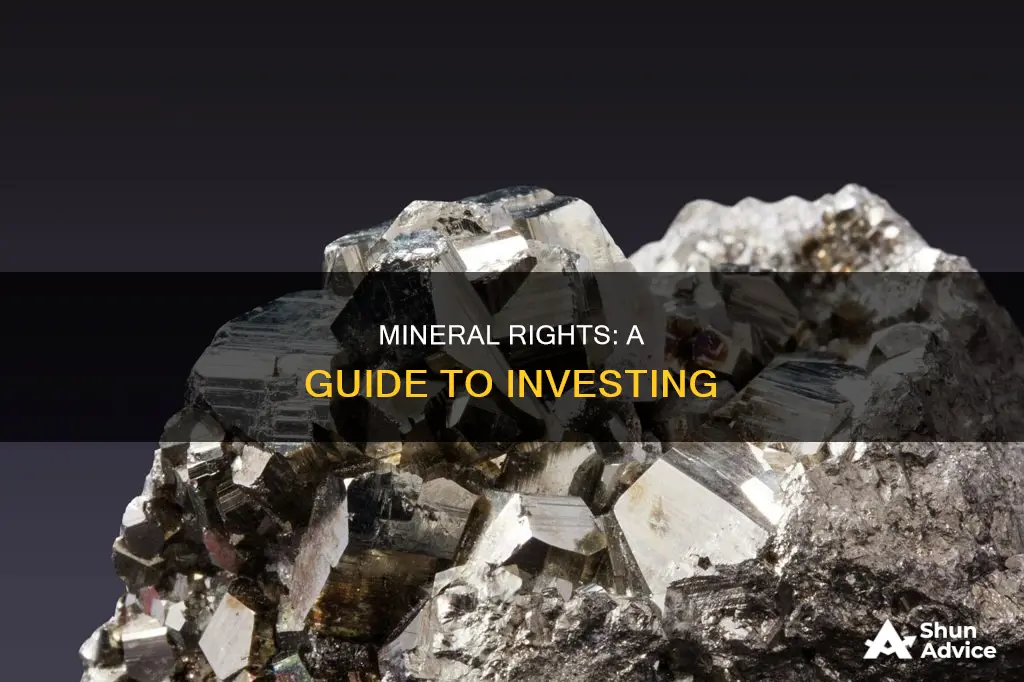
Investing in mineral rights can be a great way to generate passive income. Mineral rights give ownership of the mineral assets (metals and fossil fuels) below the surface of an area of land. Mineral rights owners are given the right to explore, develop, and extract the minerals. Mineral owners may choose to drill oil and gas wells or excavate hard rock materials like gold.
There are several benefits to investing in mineral rights, including portfolio diversification, potential for substantial high returns, and long-term investment potential as minerals are non-renewable resources. Mineral rights owners also have total control over how the property is developed, leased, or sold.
However, it is important to note that investing in mineral rights also comes with certain risks, such as commodity price risk, environmental and political headwinds, and the need for specialised equipment and expertise.
Before investing in mineral rights, it is crucial to conduct thorough research and due diligence, evaluate the mineral deposit and legal considerations, and determine your investment strategy.
| Characteristics | Values |
|---|---|
| Mineral rights ownership | Mineral owners are given the right to explore, develop, and extract the minerals. |
| Mineral rights as an investment | Short-term and long-term opportunities, portfolio diversification, potential for substantial-high returns, long-term investment, limited liability, tax benefits, valuable asset, control over the property, potential for multiple revenue streams, unique investment opportunities in a growing industry |
| Mineral interests and rights | Mineral Interest (MI), Royalty Interest (RI), Overriding Royalty Interest (ORRI), Working Interest (WI), Non-operated Working Interest, Net Profits Interest |
| Ways to invest in mineral rights | Buy the mineral rights, partnership, royalty interest, exchange-traded funds (ETFs), mutual funds, real estate investment trusts (REITs), private equity, direct investment in a mining company |
| Steps to invest in mineral rights | Research potential investment opportunities, evaluate investment opportunities, determine your investment strategy, contact a mineral rights broker or attorney, negotiate and purchase the mineral rights, conduct due diligence, close the transaction, monitor the investment |
| Risks associated with investing in mineral rights | Untrustworthy people in the oil and gas industry, commodity price risk, exploration risk, legal issues, political instability, technological obsolescence, environmental pollution, exchange rates, market downturn, high capital investment |
What You'll Learn

Mineral rights ownership: the benefits
Mineral rights ownership comes with several benefits and perks. Here are some of the advantages of investing in mineral rights:
Short-Term and Long-Term Opportunities
Mineral rights can be a great investment opportunity for both short-term and long-term investors. Private companies are often willing to pay royalties to surface rights owners for the extraction of minerals from their land. Mineral rights leases usually include signing bonuses and upfront payments, providing immediate income for the mineral rights owner. For long-term investors, revenue-sharing agreements and ongoing royalties can generate income even after the initial investment has been recovered. As mineral-proven reserves become scarcer, the value of mineral rights also tends to appreciate over time.
Limited Liability and No Environmental Risks
Mineral owners do not bear any drilling liability or expenses associated with exploration, drilling, and production. These costs are typically covered by the company carrying out these activities. Additionally, mineral owners are not exposed to environmental risks, as they are not directly involved in the extraction and production processes.
High Returns and Portfolio Diversification
The potential for substantial returns is high, especially when minerals such as natural gas or crude oil are in high demand. Investing in mineral rights also helps diversify investment portfolios, reducing overall portfolio risk. Minerals also serve as a hedge against inflation, protecting against the erosion of purchasing power over time.
Passive Income and Long-Term Investment Potential
Mineral owners receive royalties from companies extracting minerals, providing a passive income stream. As minerals are non-renewable resources, this income can continue over an extended period, ensuring earnings for mineral rights owners.
Tax Benefits and Asset Value
Owning mineral rights comes with certain tax benefits, and these investments are often exempt from taxes. Mineral rights are also considered "real" property, providing a valuable asset that can be sold to oil and gas companies for substantial amounts. The limited competition in the industry further enhances the value of these investments.
Control and Multiple Revenue Streams
Mineral rights owners have significant control over the development, leasing, and sale of their property. They can negotiate the allowed activities, royalty rates, and lease terms. Additionally, mineral rights ownership offers the potential for multiple revenue streams, including equity ownership, surface land use payments, bonus payments, and royalty payments.
Mortgage Applicants: Lying About Investment Properties
You may want to see also

How to buy mineral rights
Mineral rights refer to the ownership rights to exploit minerals from underneath a property. Mineral rights can be separate from surface rights and are not always possessed by the property owner.
Researching Mineral Rights
Before buying mineral rights, it is important to research whether the mineral rights are available for purchase. This information can be found at the local county courthouse. It is also important to research which minerals are considered the most lucrative. In the US, the most prevalent minerals for mining are oil and gas.
Purchasing Mineral Rights
When purchasing mineral rights, it is important to negotiate the terms of the sale, including the price and the specific terms of the agreement. It is also important to draw up a mineral rights agreement to finalize the deal.
Making Money Buying Mineral Rights
There are several ways to make money by buying mineral rights. One way is to lease the rights for a specific length of time rather than purchasing them outright. Another way is to purchase the mineral rights as a speculator, with the goal of selling them to another company at a higher price.
Royalties: The New Investment Craze?
You may want to see also

Mineral rights as a long-term investment
Mineral rights can be a good long-term investment opportunity. Mineral rights give ownership of the mineral assets (metals and fossil fuels) below the surface of an area of land. Mineral rights owners are given the right to explore, develop, and extract the minerals. Mineral owners may choose to drill oil and gas wells or excavate hard rock materials like gold.
- Mineral rights owners can generate income from revenue-sharing agreements and ongoing royalties. Even after recovering your initial investment, you can keep earning from royalties.
- Mineral rights would appreciate in value as mineral-proven reserves get more scarce.
- Mineral owners do not take any drilling liability and pay no expenses.
- There are no environmental risks.
- Mineral ownership can grant accredited investors limited liability. If exploration, drilling, and production are to be done by a company, then they would cover the expenses.
- Mineral rights owners have total control over how the property is developed, leased, or sold. You have the power to negotiate the allowed activities on the investment property, the amount of royalties paid, and also when the lease expires.
- Mineral rights owners generate passive income as they receive royalties from oil and gas companies that extract minerals from the land.
- Minerals are non-renewable resources, which means they have a long-term potential for value and growth. So, this ensures that oil and natural gas mineral rights owners earn for an extended period.
- Mineral rights are an investment into "real" property.
Nike: A Smart Investment Choice?
You may want to see also

Risks of investing in mineral rights
Mineral rights can be a risky investment, and it is important to be aware of the potential pitfalls before committing your money. Here are some of the key risks associated with investing in mineral rights:
Purchasing Risks
The purchasing of mineral rights can be a complex and risky process. It is important to have extensive knowledge of the oil and gas industry and the potential pitfalls of buying minerals at auction, from a broker, or directly from an owner. One common pitfall is overvaluing a property based on the initial production of a new well, which may decline sharply after the first few months. Buying interest in an old well is also risky, as the well may be near the end of its life and may be abandoned before you see a return on your investment.
Non-Producing Minerals
Non-producing minerals are those without active oil or gas wells, and therefore do not generate royalty checks. The biggest risk when purchasing non-producing minerals is that a successful well may never be drilled, or it may not perform well. Even if a successful well is drilled, there are other risks, such as an unethical operator or incorrect division orders. It is common for mineral owners to not fully understand what they own, so it is important to conduct extensive due diligence before purchasing.
Ownership Risks
Ownership of mineral rights comes with a number of risks. Oil and gas reserves are finite and will eventually be depleted, leading to a decline in royalties. Conventional wells can produce small quantities of oil and gas for decades, while horizontal wells have a shorter lifespan and steeper decline curves. Location is critical when it comes to mineral rights, as some areas may have more wells or deplete their reserves more quickly.
Political and Environmental Risks
The political climate can also impact mineral rights, with a push towards renewable energy sources potentially affecting the value of mineral rights. Additionally, there is a risk of legal disputes and environmental liabilities associated with extracting minerals.
Selling Risks
Selling mineral rights can also be risky, as you may miss out on future revenue if the minerals continue to generate royalties. It is important to get multiple quotes and have all the facts before selling, as mineral valuation is subjective and you may sell below market value.
Other Considerations
Other risks to consider include commodity price risk, technological obsolescence, and the potential for legal and regulatory changes. Investing in minerals also requires a significant amount of capital, and there is a chance that you may not see a return on your investment. It is important to have a trusted team of advisors, including a lawyer, accountant, and engineer, when considering investing in mineral rights.
Shares: Picking Winners
You may want to see also

How to identify and contact mineral owners
Mineral rights refer to the ownership of mineral assets below the surface of an area of land. Mineral rights are not always owned by the landowner, and it can be challenging to identify who owns them. Here are some steps to help you identify and contact mineral owners:
- Understand the property deed: If you are the landowner, start by reviewing your property deed. The deed will provide important information such as the type of deed, seller's information, buyer's information, transfer details, and property description. This information will be useful in your search for mineral rights ownership.
- Conduct a title search: Perform a title search to research the chain of title and identify if the mineral rights were sold separately from the land. You can do this by visiting the Recorder of Deeds office in the county where the land is located. Ask the staff for assistance in searching for previous deeds and identifying any reservations or transfers of mineral rights.
- Hire a title company: Consider hiring a title company to conduct a specialised mineral rights search. They have access to public records and can save you time and provide expertise in finding detailed records concerning mineral rights.
- Review county records: Search through county records and tax assessor's documents at the county records office. This can help you identify the ownership history of the property and any previous ownership by oil and gas companies, which could indicate retention of mineral rights.
- Check loan default and foreclosure records: If the property has a history of loan default or foreclosure, the bank may have taken control of the mineral rights. In the case of a foreclosure auction, the bank may not have transferred the mineral rights to the new owner.
- Investigate royalty deeds: Some property owners may have issued royalty deeds, which allow them to collect royalties on minerals mined from their property without conducting drilling activities.
- Contact the County Clerk: If you are unable to find the relevant information through your searches, contact the County Clerk in the county where the minerals are located. They can assist you in researching property deeds or recommend a landman to help with your research.
- Consider hiring an attorney: Engaging a lawyer is another option, especially if you believe you have valuable minerals on your land. An attorney can advise you on state laws, lease agreements, and help you understand your rights and obligations as a mineral rights owner.
Once you have identified the mineral rights owner, you can contact them directly or through their authorised representatives to discuss any opportunities or partnerships related to the mineral rights.
Apple Investors: Who's Involved?
You may want to see also
Frequently asked questions
Mineral rights give ownership of the mineral assets (metals and fossil fuels) below the surface of an area of land. Mineral rights owners are given the right to explore, develop, and extract the minerals.
Mineral rights owners do not take on any drilling liability or expenses. There are no environmental risks and it is an investment into “real” property. Mineral rights also offer portfolio diversification and the potential for substantial high returns.
One of the major risks is the presence of untrustworthy people in the oil and gas industry. There is also the risk of commodity price fluctuations, environmental pollution, and technological obsolescence.
Research potential investment opportunities, evaluate the quality of the mineral assets, determine your investment strategy, and contact a mineral rights broker or attorney. Negotiate and purchase the rights, conduct due diligence, and close the transaction.
You can buy directly from mineral owners, through mineral rights brokers, from online auctions, or through negotiated sales and sealed bids.







